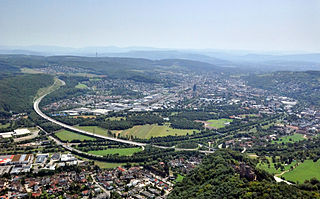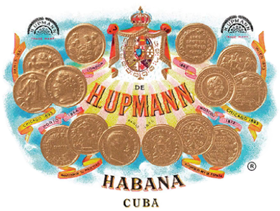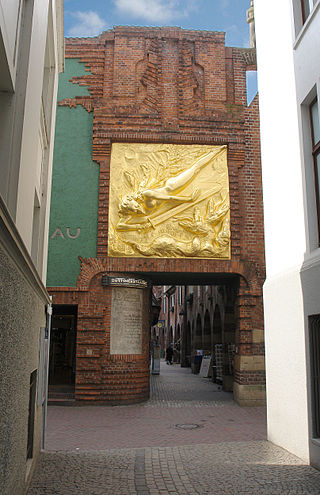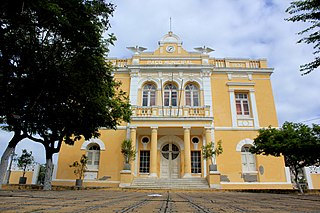
A cigar is a tobacco product made to be smoked. Cigars are produced in a variety of shapes and sizes. Since the 20th century, almost all cigars are made of three distinct components: the filler, the binder leaf which holds the filler together, and a wrapper leaf, for appearance and flavor, which is often the highest quality leaf used. Often there will be a cigar band printed with the cigar manufacturer's logo. Modern cigars can come with two or more, highlighting special qualities such as age and origin of the tobaccos used.
Constructor University, formerly Jacobs University Bremen, is an international, private, residential research university located in Vegesack, Bremen, Germany. It offers study programs in engineering, humanities, natural and social sciences, in which students can acquire bachelor's, master's or doctorate degrees.

Lörrach is a city in southwest Germany, in the valley of the Wiese, close to the French and the Swiss borders. It is the district seat of the district of Lörrach in Baden-Württemberg. It is the home of a number of large employers, including the Milka chocolate factory owned by Mondelez International. The city population has grown over the last century, with only 10,794 in 1905, it has now increased its population over 50,000.

Bremen Airport is the international airport of the city and state of Bremen in Northern Germany. It is located 3.5 km (2.2 mi) south of the city and handled 630,000 passengers in 2022. It mainly features flights to European metropolitan and leisure destinations.

Davidoff is a Swiss premium brand of cigars, cigarettes and smoker's accessories. The Davidoff cigarette brand has been owned by Imperial Brands after purchasing it in 2006. The non-cigarette portion of the Davidoff tobacco brand is owned by Oettinger Davidoff AG, which is based in Basel, Switzerland.

A cigarillo is a short, narrow cigar. Unlike cigarettes, cigarillos are wrapped in tobacco leaves or brown, tobacco-based paper. Cigarillos are smaller than regular cigars but usually larger than cigarettes. Cigarillos are usually made without filters, and are meant to be smoked like a cigar and not inhaled.

Bremer Vulkan AG was a prominent German shipbuilding company located at the Weser river in Bremen-Vegesack. It was founded in 1893 and closed in 1997 because of financial problems and mismanagement.

H. Upmann is a Cuban brand of premium cigars established by banker Hermann Dietrich Upmann. The brand is currently owned by a British corporation, Imperial Brands. The cigars are manufactured by Habanos S.A., the state-owned tobacco company in Cuba, and Altadis in La Romana, Dominican Republic.
Altendorf GmbH & Co. KG Maschinenbau, located in Minden, Germany, is a producer of sliding table saw and panel saw used in cabinetry and carpentry. The company has been in the saw-manufacture business since 1906, and is viewed as one of the leading suppliers in the saw market worldwide. The comany is based in the East Wesphalian town of Minden.

Vicente Martinez Ybor was a Spanish entrepreneur who first became a noted industrialist and cigar manufacturer in Cuba, then Key West, and finally Tampa, Florida.

Karl Friedrich Rapp was a German founder and owner of the Rapp Motorenwerke GmbH in Munich. In time this company became BMW AG. He is acknowledged by BMW AG as an indirect founder of the company.

Böttcherstraße is a street in the historic centre of Bremen, Germany. Only about 100 m (330 ft) long, it is famous for its unusual architecture and ranks among the city's main cultural landmarks and visitor attractions. Most of its buildings were erected between 1922 and 1931, primarily as a result of the initiative of Ludwig Roselius, a Bremen-based coffee-trader, who charged Bernhard Hoetger with the artistic supervision over the project. The street and its buildings are a rare example of an architectural ensemble belonging to a variant of the expressionist style. Several of the houses can be classed as Brick Expressionism. Since 1973, the ensemble has been protected by the Monument Protection Act.

In Germany, smoking is widespread and is subject to very few and lax regulations compared to other countries in Europe. Tobacco taxes in Germany are among the lowest in Europe. Germany ranks last on the Tobacco Control Scale and has sometimes been referred to as the "smoker's paradise" of Europe. According to German addiction researcher Heino Stöver, Germany has "[...] more cigarette vending machines than any other country in the world."

Events in the year 1907 in Brazil.
Geraldo de Barros was a Brazilian painter and photographer who also worked in engraving, graphic arts, and industrial design. He was a leader of the concrete art movement in Brazil, co-founding Grupo Ruptura and was known for his trailblazing work in experimental abstract photography and modernism. According to The Guardian, De Barros was "one of the most influential Brazilian artists of the 20th century." De Barros is best known for his Fotoformas (1946-1952), a series of photographs that used multiple exposures, rotated images, and abstracted forms to capture a phenomenological experience of Brazil's exponential urbanization in the mid-twentieth century.

Hermann Dietrich Upmann was a banker, merchant and cigar manufacturer in Cuba, creator of the H. Upmann 1844 brand.

Frosta AG is a frozen food company headquartered in Bremerhaven, Bremen, Germany. The corporation owns production facilities in Germany and Poland, with sales and distribution subsidiaries in the Czech Republic, Germany, Hungary, Italy, Poland and Romania. It had 1709 employees and revenues of Euro 501 million in 2017. FRoSTA is the market leader for frozen food in Germany and one of the largest in Europe.

The Town Hall of São Félix is an 18th-century municipal building in São Félix, Bahia, Brazil. São Félix was a district of Cachoeira, a municipality across the Paraguaçu River, during the Portuguese colonial period of Brazil. It experienced a boom in tobacco production in the late 19th century and became the largest producers of cigars in Brazil. Accordingly, São Félix was separated from Cachoeira and became an independent municipality in 1889. It was elevated to the level of city in 1890 and required a municipal administration building. The structure of the current town hall was the home of Líno Corrector until March 1890. It was purchased by the German-Brazilian cigar factory owner Geraldo Dannemann to adapt into a town hall. The building was a replica of a palace in Berlin. The municipal council inaugurated the town hall on December 20, 1890. The building is located in the Historic Center of the city. The structure has two stories; its façade is divided into three parts with a balcony at center and clock above.

The Bremer Philharmoniker is the official orchestra of the Free Hanseatic City of Bremen. In addition to the music theatre in the Theater Bremen they organise 28 Philharmonic concerts per season, various special, benefit and chamber concerts as well as many projects in the field of music education. Christian Kötter-Lixfeld is the artistic director of the Bremen Philharmonic Orchestra, and Marko Letonja has been its Generalmusikdirektor since the 2018/2019 season.

Villiger Sons is a Swiss multinational concern which manufactures and sells cigars and cigarillos and other tobacco products. Founded in 1888, the company is family owned and managed in the third, respectively fourth generation, and employs over 1,500 people worldwide. Villiger produces over 16 brands and has a revenue of approximately $220 million (2017). Besides owning several factories as subsidiaries in countries such as the Dominican Republic, Nicaragua and Indonesia.Villiger is also present on the U.S. market and has opened a new subsidiary of Villiger North America, Inc. in Doral, Florida in 2016.
















